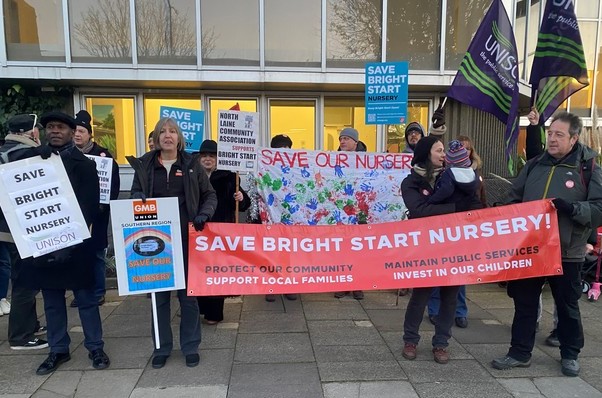Proposed cuts to early years education in Brighton and Hove prompted around 150 parents, children and members of the community to come together to protest on Saturday 4 February this year.
Those proposed cuts included the closure of the Bright Start Nursery, in Barrack Yard, Brighton. The nursery is run by Brighton and Hove City Council.
Days before the protest, the then-ruling Green administration announced a one-year stay of execution for the nursery.
Fed up with Green councillors who either waved away parents’ requests for dialogue or flat-out ignored them, we turned out to march anyway. We wanted to show we were serious.
In contrast, Labour councillors’ empathetic approach and will to listen to families at the time was much appreciated.
We are pleased to see this thoughtful approach continue in administration, with an options report on the future of the nursery due to be presented to the council’s Children, Families and Schools Committee on Monday (6 November).
The options paper gives a preferred recommendation to move the nursery to the Tarner Family Hub, close the baby room and reduce places by 39 per session to just 16.
This would leave the service unrecognisable and rob the city centre of its last full daycare facility.
Before taking this decision, we urge councillors to further explore the possibility of rehoming the nursery to another site or sustaining its current one.
Parents love Bright Start’s inclusive practice, its caring long-serving staff team, its provision of affordable care for children under two and its convenient location at the heart of the city.
There are many who feel passionately about its future but I know to others it will have little name recognition. Here’s why you should care about its fate.
Across the nation, childcare is in crisis. In the UK we have some of the most expensive childcare in the world and it seems unlikely the situation will get better soon.
The “cost of living crisis”, post-Brexit worker shortages and inadequate levels of funding have all had a role in driving up costs but what gets less attention is who delivers childcare and what they do with the money they make.
Take Busy Bees, one of Britain’s biggest childcare chains, which also operates in the city. They generated a pre-tax profit of £24 million in 2022.
Now when you consider that they offer qualified staff a starting salary of just £22,880 while asking a daily fee of £62.50 from parents, it seems unlikely that they are reinvesting this profit in the provision.
Let’s be clear, there are many excellent private providers in the city. They do a wonderful job of providing for children in many neighbourhoods.
But you don’t need to be a hardened socialist to appreciate that a national model for childcare reliant solely on private enterprise would be a bad thing.
State-run and community-led childcare has an important role to play as a leveller within the market, pushing up quality for children and pay for staff while keeping fees down for parents.

They also provide most of the provision in less affluent communities, such as Moulsecoomb and Whitehawk, which will never generate the sums needed to attract private providers, not that they should be expected to.
Without the distraction of having to provide a return on investment for shareholders, they can focus on what matters most – the children.
The private sector delivers the lion’s share of childcare within England, with around 14,000 providers operating in 2022. The voluntary sector has less than half of that, with around 6,500, and there are just 400 maintained nursery schools.
Looking at this as a static moment hides a wider picture of change. Across the nation, private sector childcare continues to grow while childminders, charities and local authorities are leaving the sector at a rapid rate.
In 2015 I did some work towards setting up a local support network for charity or committee-run nurseries in the city.
These are well-loved names – and examples include the Honey Croft Centre, Puffin Community Nursery and Fiveways Play Centre.
At the time, we identified a list of 30 such settings operating in the city. As of 2023, just 12 remain.

Demographic change has had a role to play here but, make no mistake, many of these nurseries didn’t close because we didn’t need them. Multiple new private-sector nurseries have popped up across the city to take their place.
In terms of local authority provision, Brighton and Hove is an outlier, with five excellent council-run nurseries and two highly regarded nursery schools still running.
This is great news for city residents but we must not be complacent about the situation. East Sussex County Council divested all of its local authority-run childcare back in the 2010s and Croydon Borough Council looks worryingly close to doing the same.
Local authorities have a statutory duty to ensure enough state-run school and college places. No such duty exists for the early years. The downsizing or closure of Bright Start could be the beginning of the end for council-run childcare in the city.
I’ve spent my entire career in this sector and to me it’s clear that this Conservative government has been catastrophic for the early years. I long for a Labour government, that can rebalance the country’s childcare sector by providing a new, affordable, model for childcare.
Locally, the situation is grim, and I don’t envy the budget choices local decision-makers are faced with. It takes guts to be a local councillor and it takes even more guts to still stand up for what you believe in.
Brighton and Hove has been a national leader in early years for decades. Let’s make sure it stays that way.
Alex Paterson was the manager of Bright Start Nursery from 2018 to 2022.









